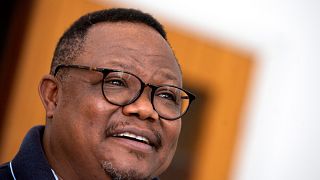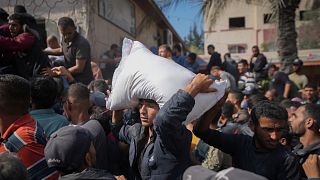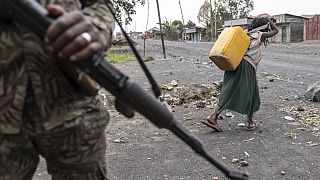Democratic Republic Of Congo
For Nelly Shukuru, life in the displacement camp had become unbearable. Forced from her home by relentless fighting, she struggled with the harsh conditions, hunger, and despair. At 51, she saw no way out and planned to end her life.
“It was morning. I took this scarf and arranged it like this so that I could use it to commit suicide. I wanted to put it there, but then I thought about my children. If one day I commit suicide, my children will be here without me,” Nelly recalled.
As she prepared to hang herself, a neighbor's timely intervention saved her life. “While I was thinking about this, someone knocked on my door. He greeted me and asked me what I wanted to do. I explained it to him, and after he asked me not to do it, I stopped.”
Years of conflict in eastern Congo have led to a severe mental health crisis, with little support available for those affected. Aid groups report a significant increase in people seeking mental health care as fighting continues to displace thousands. The conditions in the displacement camps are far from ideal for recovery, contributing to the worsening mental health situation.
According to Action Against Hunger, the number of people receiving psychosocial support in camps around Goma surged by over 200% between January and June compared to the same period last year, rising from 6,600 to more than 20,000. The organization also noted a dramatic increase in the number of people reporting suicidal thoughts, from about five a month at the beginning of the year to more than 120.
Eastern Congo, rich in minerals, has been plagued by violence as over 100 armed groups, including the M23 rebel group vie for control. The conflict has displaced millions, with over 600,000 seeking refuge in camps near Goma.
Another woman, who chose to remain anonymous, shared her harrowing experience of being raped. She now lives in the Kanyaruchinya displacement camp and struggles with suicidal thoughts. “I had gone to the field to work when I came across bandits who raped me. When they finished raping me, I wanted to commit suicide,” she said.
She credits the medical staff at the Kanyaruchinya health center for saving her life. "They advised me. Without their intervention, I would have died. They were the ones who consoled me.”
Innocent Ntamuheza, a psychologist with Action Against Hunger, emphasized the widespread trauma caused by the ongoing conflict. “Taking into account the situation that we’re living through today, there is the war, other things – really, there’s been an increase in need,” he said. “The numbers increase every day.”
As the conflict continues, the mental health needs of those displaced by the violence are growing. Despite the efforts of aid organizations, the support available is insufficient to meet the escalating demand, leaving many to cope with trauma and despair in dire conditions.











Go to video
Paris concert shines light on Congo's 'silent' war
Go to video
Goma joins global mourning for Pope Francis
Go to video
Kinshasa reacts to Trump's claim that 'many' Congolese come to US
Go to video
DRC: Goma Christians celebrate Easter under rebel rule
01:06
Sudan: Thousands flee, more remain trapped in RSF attack on Darfur camp
Go to video
Goma reacts to return of Kabila from exile